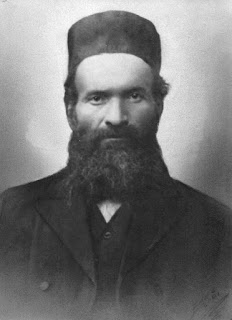Lessons from the Rebbetzin’s Heart – Parashat Ha’azinu
 |
| Rebbetzin’s Great Great Grandfather z”l |
In my father’s memoirs, there is a photo of his great grandfather, which really struck me. He wears the same kind of yarmulke-hat as my husband, and I recognize the mild pious gaze in his holy eyes. I estimate the photo to be from the middle of the 19th century more than 150 years ago. Yet, he looks like he could be someone right out of Meah Shearim today. We don’t have any information about him, except that he was from Russia. We don’t even have a name, but as I gaze into this photo I feel a deep connection, and I wonder if he learned the same kind of Torah as my husband and I. Also on my mother’s side, there is a photo of her father’s grandfather, Berish. He was a Chassid with a long beard and peyes. He had a pious modest wife, Pessel, wrapped in a shawl with a simple scarf on her head. Most Jews, today, don’t have to go back many generations to find ancestors devoted to the Torah. I’m grateful to my father for writing his memoirs and collecting photos of his ancestors. It certainly is a mitzvah to investigate our family roots as we learn from Parashat Ha’azinu:
(ז) זְכֹר יְמוֹת עוֹלָם בִּינוּ שְׁנוֹת דֹּר וָדֹר שְׁאַל אָבִיךָ וְיַגֵּדְךָ זְקֵנֶיךָ וְיֹאמְרוּ לָךְ:
When I look into the eyes of my great, great grandfather, the notion of the cyclical nature of history really hits home for me. How I long to tell him, “Grand-Zeideh! We have returned to your ways! And even more! We have returned to our homeland that you dreamed about and yearned for!” Yet, what happened to the three generations in between my grand Zeideh and I? How did it come to pass that they began to scorn the “old ways” and decided to ditch their head-coverings of subservience in order to make it in the modern secular world?
Forsaking Spirituality for the Sake of Material Pursuits
The answer is hinted at in Parashat Ha’azinu. Moshe leaves the people with a poem, which is to serve as a testament and warning to all future generations. The Ha’azinu Song contains a prophecy that our ancestors fulfilled when the opportunity to leave the shtetel of poverty presented itself:
(טו) וַיִּשְׁמַן יְשֻׁרוּן וַיִּבְעָט שָׁמַנְתָּ עָבִיתָ כָּשִׂיתָ וַיִּטּשׁ אֱלוֹהַּ עָשָׂהוּ וַיְנַבֵּל צוּר יְשֻׁעָתוֹ:
Throughout history, during exile and suffering, we proved ourselves resilient in our faith. Yet the blessings of abundance presented a greater challenge and temptation for our people to forsake the Torah for material pursuits. The leaders who were supposed to set an example for the nation regressed to materialistic lifestyles. Preoccupied with the pursuit of physical pleasures, they were no longer capable of maintaining a spiritual existence, as Sforno explained almost 500 years ago:
(טו) וישמן ישורון ויבעט. והנה גם בעלי העיון שבהם הנקראים ישורון מן אשורנו ולא קרוב עשו כמו הבהמות הבועטות בבני אדם שנותנים להם מזון: שמנת עבית כשית. הנה אתה ישורון קהל תופשי התורה ובעלי העיון פנית אל התענוגים הגשמיים ובזה עבית מחבין דקות האמת כאמרו וגם אלה ביין שגו ובשכר תעו כהן ונביא. כשית. כאמרו כי טח מראות עיניהם מהשכיל לבותם: ויטוש אלוה עשהו. ולפיכך נטש ההמון אלוה עשהו:
Just as bribe blinds the eyes, so can materialism obscure the vision of even our greatest leaders.
The Abundance-Addiction Rehab Structure of the Sukkah
After tempting Eve to eat from the Tree, Hashem told the serpent: “Cursed are you above all livestock and all wild animals! You will crawl on your belly and you will eat dust all the days of your life” (Bereishit 3:14). Why was it a curse for the serpent to eat the dust of the ground? Having our food readily available can be a curse that makes us forget Hashem, since we do not need to turn to Heaven to pray for our sustenance. Likewise, living within solid stonewalls can be isolating and separate us from Hashem’s protection. No matter how affluent and independent we may have grown, the simple Sukkah returns us to Hashem’s bosom. It takes an entire week after moving out of our comfort zone and into the shelter of the Cloud of Glory to return to our pure faith. Therefore, Hashem commands us– at the very beginning of the New Virgin Year – to dwell for seven days under the shelter of His wings as it states:
(מב) בַּסֻּכֹּת תֵּשְׁבוּ שִׁבְעַת יָמִים כָּל הָאֶזְרָח בְּיִשְׂרָאֵל יֵשְׁבוּ בַּסֻּכֹּת:
Some people may think it is enough to eat the main holiday and Shabbat meals in the Sukkah, and reside, the remainder of the week, in the comfort of their homes. Yet, this defeats the main purpose of the Sukkah to recharge our emunah by enveloping us with Hashem’s presence, and letting us get a glimpse of the stars from the apertures of its fragrant roof. A full seven-day dwelling in the Sukkah is what it takes to de-escalate the fat of rebellion caused by the comforts of abundance. Therefore, the Talmud insists:
רבא אמר מהכא בסכת תשבו שבעת ימים אמרה תורה כל שבעת הימים צא מדירת קבע ושב בדירת עראי…
‘Kicking’ Themselves Upwards in Society
It is human nature to always aspire towards progress. I do not blame our grandparents – who after generations of excruciating poverty – took advantage of the opportunity to advance their families by integrating into higher society. More comfortable, safe living conditions are conducive to better physical health. Access to cultural resources, provide opportunities for the advancement of children. When the doors of higher education opened for the European Jews, it is no wonder that the majority embraced the prospect of integrating into general society and procuring a higher living standard for their families. During this era of ‘enlightenment,’ Jews rose to become the cream of the crop, harvesting multiple Nobel prices as well as amassing prestige and material goods. Serving Hashem gradually became relegated to the background. Even the Jewish holidays took on less and less significance. Our parents were raised to ‘kick’ themselves upwards in society, yet, their material blessings did not lead to a higher level of morality and fear of G-d. It soon became apparent that materialism without spiritual content is an empty shell. The divergence of overflowing abundance and Divine service can be compared to the intake of high calorie rich foods without exercise. The surplus material is stored in the body, becoming a gross layer of excess corpulent obese fat.
Filling Our Plate with Spiritual Content
Recent generations that grew up with material abundance seek to fill their plate with spiritual content. We are no longer so hungry for food or thirsty for water, but rather for hearing the words of Hashem” (Based on Amos 8:11). We aspire to engage the natural desire for advancement into spiritual elevation and character refinement. However, spirituality does not negate material wealth, so long as we remember the true Source of our blessings. The Tishrei Holidays come to remind us that everything we have emanates from G-d. May we always remember to turn to Hashem for our needs, whether physical or spiritual and may we always be aware of how Hashem “opens His hand and satisfies the desire of every living thing!”
http://www.voices-magazine.com/#
